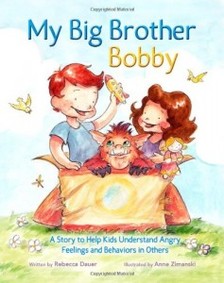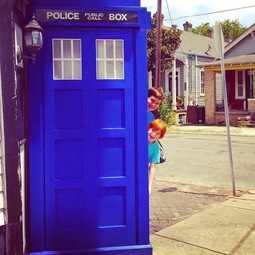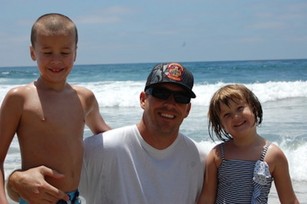 I remember exactly where I was the day “it” happened — the first time someone referred to me as a “special needs mom.” I had just walked over to a group of women who were chatting in a semi-circle when one of them casually introduced me to the others. “This is Ali,” she said, “She’s a special needs mom.” I paused for a moment. My chest tightened. I forced a smile. Maybe it was the easy way her words seemed to float out into the air around me, or maybe it was the way in which her simple phrase seemed to fill every empty space in that semi-circle. Maybe it was the lack of reaction from the others, or maybe it was the simple fact that hearing those words connected with my name — for the first time — was something I hadn’t prepared myself for. An uneasy feeling settled in my stomach. I never had envisioned that parenting a child with special needs would define me in the minds of others. There was a lot more to me than being a “special needs mom.” For example, I’m an Aquarius, I like Thai food, I enjoy shopping for sunglasses, I can’t catch a ball to save my life, I hate the way suede feels and I love a good show tune. I walked away from that experience confused. I wanted to hate what she said, and yet, another part of me desperately clung to her words. As much as I detested the phrase “special needs mom,” I surprisingly found some comfort in it. For the first time since my daughter was born with hypotonia, I almost felt a sense of belonging. Maybe I had finally found people who could understand me — people who understood the struggle of shopping for shoes that can fit over braces, people who shared my frustrations about wait times for neurology appointments, people who could celebrate with me the “inchstones” in our lives. Maybe I had finally found my “village.” Slowly, I became accustomed to the introduction, to the conversation, to the title — to being a “special needs mom.” But that all changed the day a woman insinuated I didn’t belong in the special needs community. “Well, your kid has some struggles,” she stated, “but all kids do. At least your kid walks and talks. She doesn’t really have special needs.” I didn’t know if her words were meant to be encouraging or exclusionary. My mind raced — almost as fast as my heart — but all words escaped me. Despite her hypotonia, my daughter functions well in many environments. But her hypotonia is still there. It’s hidden deep inside her muscles, causing her to have trouble walking up and down the steps or keeping up with her peers. It’s the reason she was delayed in all of her gross motor milestones. It’s why her fine motor skills are still a year behind her actual age. Just because her hypotonia isn’t always readily visible to the untrained eye, it doesn’t mean her hypotonia isn’t there. But does the invisibility of her disability mean we don’t belong? Does the fact her disability is mild in comparison to some children mean that she doesn’t have special needs in other people’s eyes? I pondered these questions and many more, and I came to one conclusion: Maybe I really don’t belong in just one specific mom circle. I am a mom in the middle. A mom of a child without a diagnosis but with delays. A mom with many worries and with little answers. A mom who feared her child may never walk, but who now chases her child in the backyard, through the grocery store and around the house, especially at bedtime. A mom who spends her days at the park playground and her evenings at physical therapy sessions. A mom of a child who appears typical to some and anything but typical to others. I exist in a sort of limbo — between two worlds, both of which meet my needs and yet, could never really understand what I experience. I am a mom in the middle, and I know there are other moms like me. Moms who are searching for their place in the murky waters that exist between the typically developing world and the special needs community. Moms who are trying to figure out just where they fit in. To other moms in the middle, on days when you feel lost, when you think no one really understands what you’re experiencing, when you are left questioning where exactly you belong, please know this: You are not alone. I will always have a spot right by me for you — right in the middle — and everyone is welcome here. Article originally posted on The Mighty
0 Comments
 Being angry, seeing red, meltdowns, and freaking out are just a few words we have to describe what happens when a person loses control of themselves. My Big Brother Bobby: Understand Angry Feelings and Behaviors of Others by Rebecca Dauer helps siblings, classmates, friends and other family members to understand children who struggle with emotional and behavioral problems. For some of our children their lives or their environment become overwhelming. They just can’t deal with all the sensory bombardments and may act out, withdraw, become emotional, run, etc. My Big Brother Bobby is a fun, imaginative story that educates children on the importance of understanding and coping with anger in others in a warm and easy to understand way. It isn’t your typical children’s book. It is more of a communication bridge between parents, social workers, OTs, psychologists and children who are dealing with emotional issues, specifically those living with siblings with angry outbursts. Rebecca’s blog is a wealth of information about siblings of children with special needs. We thank Rebecca Dauer for her guest post introducing her book and agreeing to take part in our Author Interview Series. Lorna: Congratulations of your book, My Big Brother Bobby: Understand Angry Feelings and Behaviors of Others. What is the story behind this book? Why did you think a book on this topic was needed? <<Rebecca Dauer: The story behind the book is loosely based on stories from friends and family as well as my personal experiences. When I was younger, there was very little materials or outlets for siblings and I felt the need to change it. After doing research for the book, I found an immense amount of support from the sibling community. Everyone can relate to this book, whether it is a parent, sibling, cousin or friend who has a monster in their belly, it is hard on everyone and especially for young children. I wanted to bring to light the real struggles and emotions that children have and to bridge the communication gap for parents and health professionals.>> Lorna: You and the illustrator, Annie Zimanski, make a very good team. Annie’s illustrations bring your story to life! Usually how does the author of a picture book work with the illustrator? It seems to me there is a lot of communication that most go on to finish with a beautiful book like My Big Brother Bobby. <<Rebecca Dauer: Great question! I found Annie on elance.com after searching through several children’s book illustrators. I loved her work and she related well to the book. The first step in the process is to understand the story and then, creating the characters in the right medium. For example, they could look digital, acrylic or have a soft pastel look. Each change of color, character and background give a different look and feel to the book. Once the characters are built, then you break down each illustration by page with a sketch. Once each page is sketched and tweaks have been made, full color and background detail is added. Then there are a few final edits and that’s it! I enjoyed working with Annie and would recommend her to anyone looking for a great illustrator.>> Lorna: Is this your first book? You chose to self-publish it. What advice do you have for other authors who are thinking of self-publishing their book? <<Rebecca Dauer: Yes this is my first book. Self-publishing is a bit more streamlined and inexpensive because you don’t need an agent or wait until you are signed. If you have a PDF version of your book, you simple buy an ISBN and upload online. I used CreateSpace through amazon where books are purchased on demand. I was also able to add the book to the app store. I also became a member of the Independent Book Publishing Association (IBPA) for its resources and helpful guides into the publishing world. I recommend using those, becoming a member of IBPA, creating a website and promoting through social media.>> Lorna: In your book you mention a support organization for siblings, Sibling Leandership Network and the Sibling Support Project. Please tell us what they offer siblings. <<Rebecca Dauer: The SLN and the Sibling Support Project are completely dedicated to helping the siblings of children who are physically or mentally disabled. The SLN provides siblings of individuals with disabilities the information, support and tools to advocate for their brother or sister to promote the issues important to them and their entire family. They are also very involved in policy and advocacy. The Sibling Support Project headed by Don Meyer (who wrote a review for my book) is a national effort dedicated to the life-long concerns of brother and sisters of people who have special health, developmental, or mental health concerns. Sibshops are International and give children a community-based peer support program and provide awareness of siblings unique, lifelong, and ever changing concerns through workshops, websites, and written material. It is an amazing community and organization. If you would like more information, please visit below: -To keep reading the article please click: HERE  *Editor's note: The following was a conversation I was lucky to be privy to between my two sons, over the course of about twenty minutes. I've omitted several things for privacy, and cleaned up others, while trying to keep the language as close to the original conversation as possible. I received both sons' permissions before publishing this. "Morgan," Bay asked, "what's it like to be you?" The question was asked as the boys finished dinner and I sat away from them, reading a book. I marked my place and quietly listened. "Well," Morgan said, "it's confusing. You know I'm an autism kid. Noises are big. Clothes have to be soft. Smells are hard." He went back to eating, apparently satisfied with his answers. "But, Morgan, what's it like? Why is it confusing to be you?" Morgan took a deep breath, pondered this question some, and then said, haltingly, "People think I don't listen, but I do. Teacher always says, 'Pay attention, sweet boy!' but I am paying attention. It's hard. I pay attention to everything, all at the same time. I can't pay attention to just one thing... I can't always use my words." "There are all of these sounds and thinks (thoughts) and I can't just pick one. Can you?" I sat, stunned. Morgan's never talked to his father or I like this. He's never really been able or rather, we've never been able, to get him to talk to us like this. "Morgan," his brother started, "why do you script? Why do you use Thomas so much and love him so much?" "I just do. The stories are in my head, 'cause I'm a narrator. I love Thomas, he's my friend. He's a very useful, cheeky engine." "But you know, other kids don't like him as much, right? I mean, aren't you worried about bullies? Why do you talk like that (meaning nasally quality/monotone and scripting)?" "I don't care if they don't like him, Mama says he's mine to love. Mama and Daddy say bullies just don't get hugged enough. I told you- I talk like this 'cause Jesus made me this way. Now, stop being a bossy boiler or this conversation is over!" (note the script) Me: "Morgan, is there anything that's really hard for you?" "Yeah, people when they give me too many directions. That's hard." Having my own struggles with this, I agreed with him. "Going new places used to be bad, but sometimes it's fun now. But not too much. Rounding (numbers). Noise. Making people understand me." "Haircuts used to be really hard, right?" "Yep, but they're not so bad now. The hairs still feel like poking on my skin, and I'm scared my ears'll be chopped off." "Mama won't cut your ears off-" "But I feel the scissors coming in! My brain tells me my ears are in danger and I need to yell!" Me: "What would you make people understand?" "I need to chuff (when he makes train noises and moves his arms in a circular motion, bent at the elbows). Ya know, trees stim? I'm a good boy and really useful. Don't talk about me in front of me. Kids shouldn't make fun, the grown ups, either. It's mean. People should understand people." I started tearing up. Bay: "What's easy for you? You're good at lots." "Making breakfast (he makes English muffins with cream cheese every morning for himself). Thomas stories. Tying my shoes. Making train sets. Snuggling. Smiling. Laughing. Swimming. Remembering the way." To read the rest of this amazing article click here: http://www.decipher-morgan.com/2014/10/what-its-like.html  Below is a letter I’ve written to my daughter. She’s the younger of our two kids. But I already see that in some situations, she takes the big sister role. I so badly want her to understand her brother’s autism. I know she notices that he gets more attention than she does… and I don’t think it will stop. Anyways, here it is. Dear Lucy, I’ve been thinking about writing this letter to you for about a year now. In that time, I’ve been noticing you noticing me… and it hasn’t always been positive. For the most part I think I’ve been doing a pretty good job as a parent and daddy. But I know I’m letting you down in a crucial area of your life, and I’m not sure that I can stop. In the last couple of weeks, I’ve made you cry, and it breaks my heart because I know it will not be the last time I do so. I’ve ignored you, favored your brother, and I know it hurts your heart. I just want to let you know — I’m aware of this, and it hurts my heart too. You’re the baby of our family, and as much as I want you to always be Daddy’s baby, I also want you to grow up quickly so you can gain a certain amount of understanding. I guess I want this for you so I don’t feel like I’m damaging you as much. You see, your older brother has autism, and I fear that it takes from you at times. I started a nonprofit organization because of your brother, in hopes that we could help other families. It takes up a ton of my time. When you ask me to play while I’m working, I tell you, “No” way more than I tell you, “Yes.” I see that it breaks your heart. It breaks mine too. The local news did a interview with me, and your brother was in it. You watched it and didn’t understand why you weren’t included. I didn’t have a good answer. I didn’t think you would understand. We shot a brand new “About Us” video, and you asked me, with tears in your eyes, “Why am I not in that video?” Once again, I didn’t have a good answer for you. You left the room, and then the tears hit my eyes. Your brother has behavior therapy twice a week for two and a half hours a session and a socialization class once a week. You don’t understand why you don’t get to do these things. I try to explain it. I clearly don’t do a good job. You’re developing at a rapid pace, and I’m in constant amazement at how easy you learn. It also serves as a constant reminder that your brother doesn’t have it this easy. I need to stop and celebrate you more. You deserve it. You and your brother are playing on the same soccer team for the first time, and you’re holding your own with these older kids. Daddy is so proud of you! But, if I’m being honest, I catch myself watching your brother more than I watch you. And it’s not fair to you. I think it’s because I expect you to keep getting better. When I watch him, I’m hoping he gets better. I’ve tried a couple of times to explain autism to you. I’m pretty sure you don’t fully understand. I’m not sure why I expect you to, when most people 10 times your age don’t get it. Someday you will… I just wish it was today. Please know that Daddy is doing his best and also know that he wants to do better. I love you way more than you know. For original article: http://themighty.com/2014/09/a-letter-to-my-daughter-about-her-brothers-disability/ |
AuthorRebecca is an independent publisher working to help siblings of children with emotional challenges. Archives
April 2017
Categories
All
|
My Big Brother Bobby: A Story to Help Kids Understand Angry Feelings and Behaviors in Others
 RSS Feed
RSS Feed
